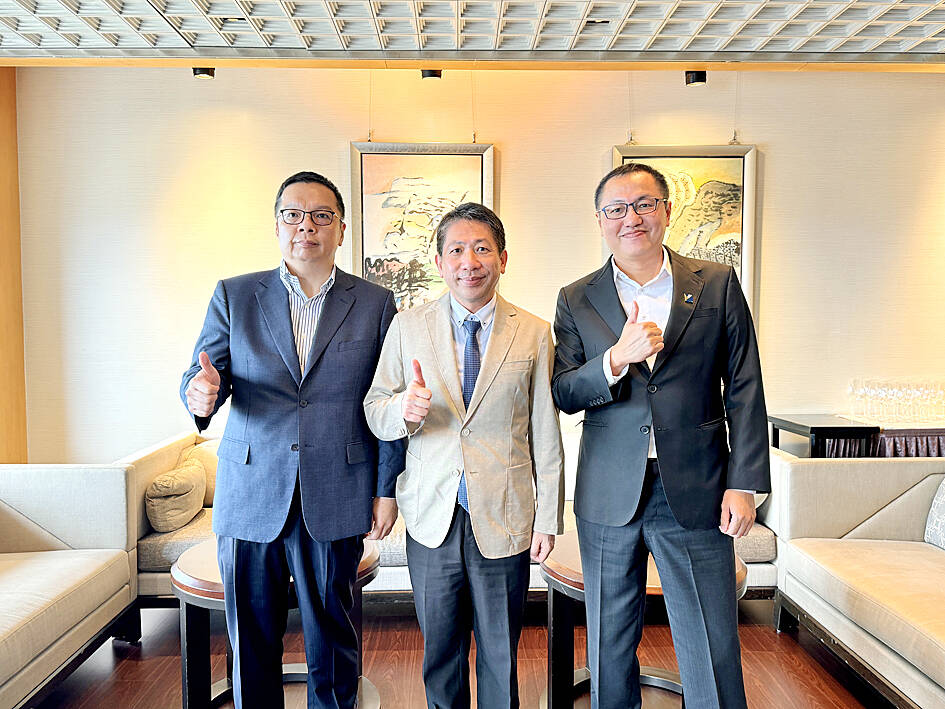Semiconductor equipment and chemicals supplier Acter Group Co (聖暉) yesterday said it is accelerating its overseas expansion primarily in Japan and Southeast Asia this year as customers are building new fabs in reponse to robust demand for artificial intelligence (AI), 5G, servers and data centers.
Customers are diversifying their manufacturing sites geographically due to mounting geopolitical risks, Acter said.
The company’s strategy is to also expand its global footprint, it said.

Photo courtesy of Acter Group Co
Acter counts Taiwan Semiconductor Manufacturing Co (TSMC, 台積電), United Microelectronics Co (聯電), Intel Corp, Nvidia Corp and Alphabet Inc’s Google among its major clients.
In addition to Asia, the company is also looking at Mexico and the US for further expansion projects together with its subsidiaries, Acter said.
The company is also seeking mergers and acquisitions, or strategic partnerships, to expand its global footprint, it said.
“As a number of our customers are relocating their supply chains to Southeast Asia, Japan and India, those three areas are our top priority for overseas expansion. I am planning a trip to India next week,” Acter spokesman Jeff Liang (梁鈞幃) said.
“We are following our customers to expand our operations,” Liang said. “In India, we have customers in the electronic components and semiconductor industries.”
Malaysia would be the nation with the most promising growth prospects, given that some of Acter’s major customers have unveiled new data center investment plans in the Southeast Asian nation, Liang said.
Acter for the past 10 years has been helping customers build fabs in Malaysia, he said.
The firm said it also expects to expand its operations in Thailand, without disclosing specific plans.
Acter’s subsidiary Rayzher Industrial Co (銳澤) last month set up a branch in Kumamoto, Japan, and plans to hire 10 to 20 employees.
TSMC, a key customer of Rayzher, is operating a fab in Kumamoto and plans to build a second fab.
Rayzher is planning a second overseas site in the second half of this year, likely in Germany, where TSMC plans to build a new 12-inch fab through a joint venture with its customers.
Acter yesterday raised its revenue growth forecast due to robust demand from semiconductor firms.
The company has more than 10 projects to build data centers at home or overseas, it said.
Acter has secured record-high orders amounting to NT$33 billion (US$1.02 billion), 60 percent of which come from semiconductor customers, Liang said.
“We were conservative about this year’s growth, but now we expect to get back on the growth track this year based on our better performance in the first five months,” Liang said.
Acter’s revenue rose about 5 percent year-on-year in the first five months to NT$10.36 billion.
Last year, its revenue fell 11.33 percent year-on-year.

United Microelectronics Corp (UMC, 聯電) expects its addressable market to grow by a low single-digit percentage this year, lower than the overall foundry industry’s 15 percent expansion and the global semiconductor industry’s 10 percent growth, the contract chipmaker said yesterday after reporting the worst profit in four-and-a-half years in the fourth quarter of last year. Growth would be fueled by demand for artificial intelligence (AI) servers, a moderate recovery in consumer electronics and an increase in semiconductor content, UMC said. “UMC’s goal is to outgrow our addressable market while maintaining our structural profitability,” UMC copresident Jason Wang (王石) told an online earnings

Gudeng Precision Industrial Co (家登精密), the sole extreme ultraviolet (EUV) pod supplier to Taiwan Semiconductor Manufacturing Co (TSMC, 台積電), is aiming to expand revenue to NT$10 billion (US$304.8 million) this year, as it expects the artificial intelligence (AI) boom to drive demand for wafer delivery pods and pods used in advanced packaging technology. That suggests the firm’s revenue could grow as much as 53 percent this year, after it posted a 28.91 percent increase to NT$6.55 billion last year, exceeding its 20 percent growth target. “We usually set an aggressive target internally to drive further growth. This year, our target is to

The TAIEX ended the Year of the Dragon yesterday up about 30 percent, led by contract chipmaker Taiwan Semiconductor Manufacturing Co (TSMC, 台積電). The benchmark index closed up 225.40 points, or 0.97 percent, at 23,525.41 on the last trading session of the Year of the Dragon before the Lunar New Year holiday ushers in the Year of the Snake. During the Year of the Dragon, the TAIEX rose 5,429.34 points, the highest ever, while the 30 percent increase in the year was the second-highest behind only a 30.84 percent gain in the Year of the Rat from Jan. 25, 2020, to Feb.

Cryptocurrencies gave a lukewarm reception to US President Donald Trump’s first policy moves on digital assets, notching small gains after he commissioned a report on regulation and a crypto reserve. Bitcoin has been broadly steady since Trump took office on Monday and was trading at about US$105,000 yesterday as some of the euphoria around a hoped-for revolution in cryptocurrency regulation ebbed. Smaller cryptocurrency ether has likewise had a fairly steady week, although was up 5 percent in the Asia day to US$3,420. Bitcoin had been one of the most spectacular “Trump trades” in financial markets, gaining 50 percent to break above US$100,000 and